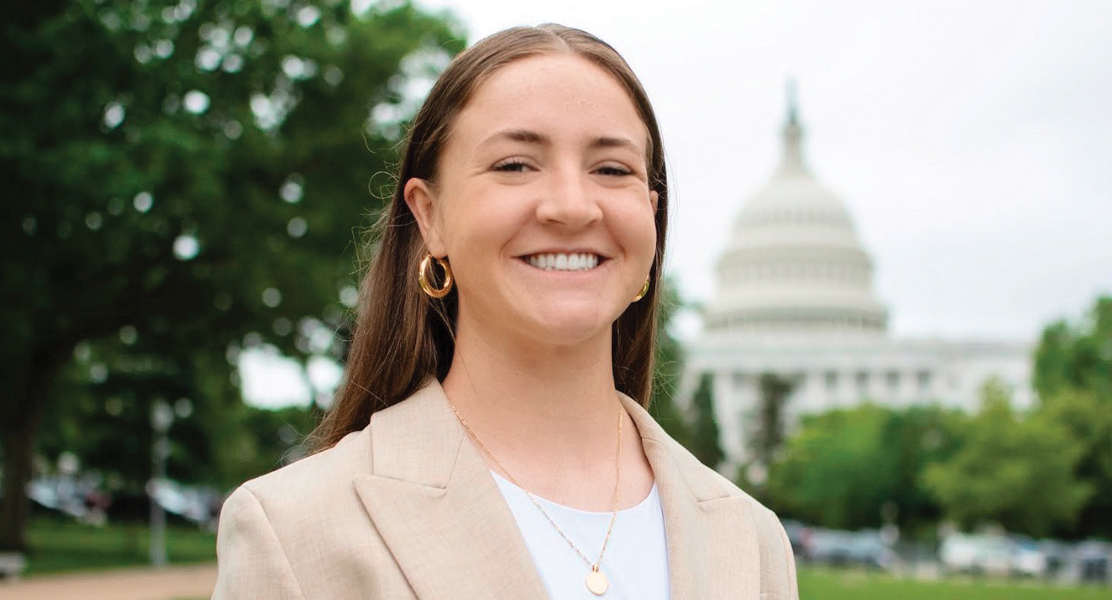A Christian athlete’s response to the ‘coach prayer’ case
Too often, Christianity in sports is limited to how many verses you can write on your sporting equipment and how loud you can pray after games.

By Georgia McKee
The moment I put on my jersey as a NCAA division 1 college athlete, my childhood dreams came true. I spent my middle and high school years fervently and diligently mastering my craft of softball, building my strength, and impressing coaches. But, being an elite athlete wasn’t the only identity I wanted to master — I wanted to be an elite Christian athlete.
Growing up in Texas, I noticed a hyper-fixation on loud, bold declarations of Christian faith in sports. It seemed expected to kneel in the end zone after scoring a touchdown, point to the sky after a home run, or give God all of the credit in the post-game interview. The face of religion in sports was an altar-call, conversion-focused, Tim Tebow-brand of Christianity. As an athlete, I wanted to express my religious identity within my sport, but I did not know how to do it other than in an overtly public and — looking back at it — obnoxious way.
But, I tried my best. I engraved a cross into my glove, purchased Bibles for my teammates, and joined the leadership team for the Fellowship of Christian Athletes. Surely this was how you practiced religion in sports!
I attended a Christian university and never blinked an eye when my coach talked about his Christian faith. Although many of my teammates didn’t identify as Christians, they knew The Lord’s Prayer and prominent Bible stories because our coach made it a regular part of our training. I didn’t see the harm of integrating the Christian faith into our team until one day when we gathered for a huddle before playing our local rival.
“My biggest fear is that I won’t see all my players in Heaven. Will I see you there?” my coach asked, looking down at all his players aligned on a bench.
This struck me as an odd way to motivate a group of 18-to-22-year-old women before one of the most important games of the season. The air was heavy, and silence never felt so loud. I watched as my teammates avoided eye contact with our coach and sat uncomfortably on the bench. Some were angry, and others just wanted the conversation to end so we could focus on the game. No one dared to speak up because, well, you didn’t want to be the person to upset our former Green Beret coach. Before anyone could break the silence, the umpire came to our dugout, “It’s time for us to start the game.”
What would it look like if Christian athletes and coaches expressed their faith by listening to each other’s stories, praying behind closed doors, dedicating themselves to radical love, and taking the overall mental, psychological, and physical health of athletes seriously instead of coercing people to pray and believe as they do? It’s a big question, but it’s one that we need to ask in light of recent Supreme Court decisions and the national conversation around faith in public life.
In Kennedy v. Bremerton, the U.S. Supreme Court ruled in favor of a public school coach named Joe Kennedy who claimed a right to pray on the 50-yard-line immediately after football games. He had a history of praying with players, and while those facts were not part of the Court’s ruling, the decision ignores that history and the power disparity between coaches and players when it comes to the protection of religious liberty.
Regardless of the constitutionality of any particular act by a coach, I’d like to hear more concern about the well-being of athletes and the integrity of the Christian faith. Surely, Christian coaches and athletes should find ways to express their faith that respects the autonomy of all people, regardless of what the Supreme Court says is potentially permissible.
Too often, Christianity in sports is limited to how many verses you can write on your sporting equipment and how loud you can pray after games. Don’t get me wrong: I’m not against displaying Bible verses and praying; I’m against using elements of the Christian faith to divide one of the only places left where people from all walks of life can unify for the common good. Athletes should be able to bring their whole selves to their sport without feeling pressured to leave anything at the door.
I like the way former Justice Sandra Day O’Connor explained religious liberty and the idea of being equals. She said that government endorsement of religion “sends a message to nonadherents that they are outsiders, not full members of the … community, and an accompanying message to adherents that they are insiders, favored members of the primal community.”
When you pray at the 50-yard line after a game, you’re saying, “Those of you who are here are in, and those who aren’t are out.”
Coach Joe Kennedy was my coach. Not literally (although I like to think I’d make a pretty good quarterback), but he represents many of the coaches I experienced during my 15 years in athletics. I’ve watched handfuls of athletes leave Christianity — and athletics — because of the way Christianity is portrayed by their coach or teammates. I want to believe there is a better way of being Christ’s hands and feet than praying on the 50-yard line.
Georgia McKee is the co-founder of Christian Athlete Circles, a second-year student at Wake Forest University School of Divinity, and the digital communications associate at BJC.
This article first appeared in the fall 2022 edition of Report from the Capital. You can download it as a PDF or read a digital flip-through edition.




